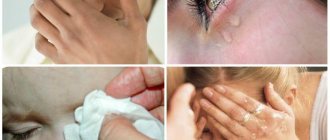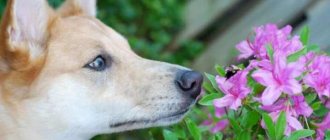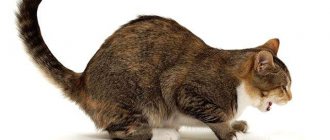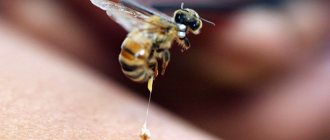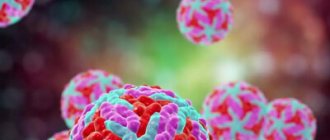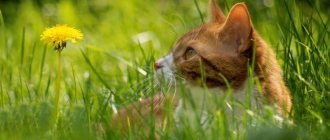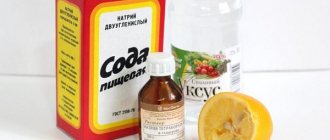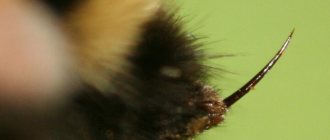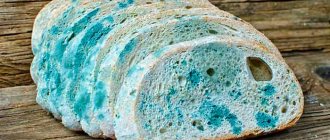What to do if a pregnant woman is bitten by a bee or wasp
The worrying question for most women is what to do if a pregnant woman is bitten by a bee or wasp. Bees and wasps are extremely unpleasant insects, although they are useful. Many people are allergic to the bites of these insects. Such situations are especially dangerous during pregnancy, when a woman cannot alleviate her condition, since it is undesirable to use drugs and medications.
Difference between a wasp and a bee
Before moving on to first aid for an attack by stalk-bellied insects, it is necessary to understand the differences between a bee sting and a wasp sting.
Bee
She can only bite if she senses danger. For example, in the case when her nest was accidentally touched. The bee's reaction is rapid. When it bites, it inserts its sting into the skin. You can only pull it out with tweezers. After the attack, the bee dies, and the poison poisons the tissue around the sting, forming extensive swelling.
Wasp
Wasps behave more aggressively than bees, and they do not need a reason to attack. The period of increased activity occurs during the peak of the heat. At this time, they are in search of water and can bite anyone who gets in their way. It is noteworthy that after the attack the wasps do not die and can attack again.
Bee sting during pregnancy: what to do
While the weather is sunny and hot, no one is safe from attacks by wasps or bees. The most unpleasant thing is that you don’t need to go to nature to meet insects, just go outside. The slightest carelessness, and the bite will not take long to occur.
A bee, as a rule, stings if it senses an attack, so you should not wave your hands in its direction. It stings painfully. A sting may remain at the site of injury, which will add to the discomfort. Thus, the bee injects poison, from which the sting area immediately swells. This poison is considered highly allergenic and can even cause a reaction such as anaphylactic shock, so you need to act quickly. The most dangerous bite sites:
- Head.
- Language. Swelling may occur so much that it becomes impossible to breathe.
- Cheek.
But such a reaction is rare. Usually what is dangerous is the bite, and wrong actions after it. Expectant mothers are afraid to the point of losing consciousness that the poison will affect the baby, so they begin to take urgent measures. It cannot be absorbed through the placenta, so it is absolutely harmless to the fetus.
Safe products for pregnant women:
- Paracetamol. If the area is very swollen, then you should not endure the pain. A medication tablet will help quickly relieve discomfort and will not affect the baby.
- Menovazin ointment. Specially designed to relieve discomfort after insect vinegar.
- No-shpa. Probably the most famous antispasmodic. Helps relieve pain symptoms without causing harm.
You can avoid using pharmaceuticals, but use traditional methods. The first step is to remove the sting if it remains in the wound. To do this, use tweezers. Next, you need to wash the damaged area with soapy water, it will both clean the wound and disinfect it. The patient should also drink plenty of fluids if there is no severe swelling and the kidneys are working without interruption. Water will help quickly remove toxins that have been released into the body.
An ice compress can be used to relieve itching, but its usefulness depends on the location of the injury. You can apply a paste of raw potatoes. It helps relieve discomfort.
Any remedy that a pregnant woman is going to use must be agreed with the doctor. There will be no harm to a child from a bee or wasp sting, but there may be harm from used pharmaceuticals.
Folk recipes
Alternative medicine often comes to the rescue during pregnancy. Indeed, in some settlements the nearest medical center or pharmacy is hundreds of meters away. In such cases, you need to know what to do and what natural medicines can provide anti-inflammatory and antiseptic effects.
- Parsley. A common plant that relieves various types of inflammation well. If a bee or wasp stings, parsley leaves should be crushed with a mortar or crushed in a blender. Then put it on a cotton pad and apply it to the painful area. After half an hour, the pain will begin to subside.
- Plantain. The leaves of the medicinal plant are familiar to many from childhood. They relieve swelling and have a disinfecting effect. Its use together with parsley juice is also effective. To do this, apply a compress from a leaf soaked in juice to the inflamed area. You can make a decoction of plantain and yarrow in equal proportions. Transfer the squeeze to a piece of gauze and apply to the bite site. Soak it in the broth and change it every 2 hours.
- Bulb onions. A vegetable whose juice has strong bactericidal properties. To obtain juice, the onion is grated and squeezed. Dip a clean napkin into the liquid without squeezing. It is not recommended to keep it on the inflamed area where the insect has bitten for more than 20 minutes. If you ignore this recommendation, irritation may increase.
- Oil. Vegetable, olive, corn or any other type of oil is always on hand. An oil swab applied to the bite will create a protective film that prevents the spread of infection.
Prohibited medications for pregnant women due to insect bites
In order not to harm the child, it is important to consult a doctor from the antenatal clinic before taking any drug. The following medications are strictly prohibited during pregnancy:
- Aspirin. It should not be used for the entire 9 months of pregnancy. Paracetamol is prescribed instead.
- Diphenhydramine. A very strong remedy that is absorbed through the placenta. It is prescribed to relieve spreading swelling, but it is strictly prohibited for pregnant women, especially in the first and last trimester. You can read about how to remove swelling if you are bitten by a bee here.
- Advantan. Available in the form of an ointment. It reduces swelling and relieves itching. Can't be used either.
Antihistamines, such as Loratadine, Suprastin, Fenistil, are used with extreme caution and only with the knowledge of the doctor.
Also, all of the drugs listed above are prohibited during lactation.
Wasp venom, pregnancy and breast milk: no intersection points found
A child carried by a healthy pregnant woman is 100% protected from wasp venom. From a physiological point of view, it is not so difficult to explain: during a bite, the toxin enters the mother’s blood, and along with it necessarily passes through the liver, where it undergoes a kind of biological “utilization.”
Wasp venom is also unable to penetrate the placenta, so its direct contact with the fetus of a pregnant woman is excluded. Even if the wasp sting fell on the stomach, resulting in a noticeable lump, there is no need to worry.
The poison is even less likely to penetrate breast milk. To do this, it also needs to pass through the liver of a nursing mother, and then somehow be able to get directly into the mammary glands. In a normal situation, this is excluded, therefore, as during pregnancy, a wasp sting during breastfeeding does not pose any danger to the child.
Review
“We were very lucky with our pediatrician. Such a balanced, generally impenetrable woman. She has enough experience for others to last five lifetimes. When I was once bitten by a wasp while breastfeeding, I was so worried, I was afraid that I would have to interrupt breastfeeding, and this was in the third month. I called her, barely able to speak from fright. She calmed me down so well, said that there was nothing dangerous in this situation at all, told me to go to bed calmly and not worry about anything. And indeed, nothing happened. Even though the bite was on the shoulder, not far from the chest. It took a week, the little one didn’t even feel anything.”
Oksana, Moscow
It is also useful to read: What to do if a wasp sting is very itchy
When a bite is dangerous
It is important to know when to urgently call an ambulance. It is imperative to take action if a woman exhibits the following symptoms:
- Swelling that spreads throughout the body.
- Shortness of breath.
- Dizziness.
- Chest pain.
- Nausea.
- Cardiopalmus.
A pregnant woman may develop anaphylactic shock, so you can react quickly. Call a doctor urgently. Even if a simple allergy occurs, you need to consult a doctor, because it can negatively affect the fetus. You should read in detail about how to deal with swelling after a wasp sting here.
Difficulties in treating wasp bites during pregnancy and breastfeeding
As mentioned above, the vast majority of medications are prohibited during pregnancy and breastfeeding, including those that are usually used to eliminate the symptoms that appear after a wasp sting. This is one of the important problems that worries pregnant and lactating women.
So, if you were bitten by a wasp during pregnancy, you should not use, for example, the following drugs:
- Aspirin, which is usually used to relieve pain after a bite and relieve fever if it suddenly rises;
- Diphenhydramine, which prevents the spread of edema;
- Advantan is an ointment intended to limit swelling and relieve itching.
Review
“We once had a situation where a nursing mother was bitten by a wasp in the wild. As luck would have it, it happened in the heat of the day, but there wasn’t a single car in the village—everything was in the field. The girl was blown to pieces, her legs were swollen, and there was also a small child, not even six months old. I was still little then, I lived in a neighboring house, I was scared. But good, then the ambulance arrived from the regional center in half an hour, probably. The doctor looked at it and said that there was no need to do anything, because medications could cause even more trouble. And indeed, the very next day everything returned to normal for mom. The bite itself was very large, but the swelling subsided and the milk did not disappear.”
Tatiana, Art. Kamenskaya
When breastfeeding, the independent use of any antihistamines is prohibited, including the most “favorite” ones in such cases: Suprastin, Loratadine and Diphenhydramine.
If these drugs are used in the first trimester of pregnancy, they can have a mutagenic effect on the developing fetus, and in the later stages can lead to premature birth. This means that if a pregnant woman shows even the slightest signs of an allergy to a wasp sting, she should go to the hospital as soon as possible.
On a note
During pregnancy, under the strict supervision of a doctor, it is allowed to use Suprastin, Fenistil and Zyrtec. However, they are used only in special cases when these drugs are vital for the mother’s body.
Prevention of insect bites
This situation can happen to anyone in the summer. No one is immune from being stung by bees, wasps, or dogs. You can find out what injections are given for a dog bite here.
But to minimize the risks of such a situation with insects, you need to take preventive measures. These include:
- You should not leave berries, fruits, jam, or honey uncovered on the table.
- If bottles with sweet liquid were left in the open air, then you should not drink from them. There may be insects swimming there. And if a bee stings your throat, there may be swelling that will not allow you to breathe.
- During the period when insects are active, you should not wear brightly colored clothing.
- It is worth wiping your mouth with a damp napkin after eating sweet food.
- You cannot walk barefoot in flowering meadows; you may accidentally step on a bee or wasp.
- It is necessary to minimize the use of perfumes and cosmetics with floral scents.
- Wasps love to build a nest next to a balcony or terrace. It is worth checking the area periodically for nests. If they appear, immediate action is taken.
- Wasps are pretty nasty. They can be annoying for a long time, and then eventually attack and sting, more than once. To avoid a protracted conflict with insects, you should leave the area where they are located.
These measures will help avoid unpleasant situations associated with insects.
Consequences of a wasp sting for pregnant women
After conception, a woman’s body undergoes many transformations. Hormonal changes reduce immunity and the body's protective functions. The reaction to external and internal stimuli becomes more pronounced. Even those foods and odors that were previously easily tolerated can provoke an allergic reaction.
A wasp sting during pregnancy is dangerous due to an allergic reaction of varying severity. The woman’s further actions depend on the clinical picture. In some cases, providing minimal first aid is sufficient, in others you need to immediately call a specialist.
Whether a wasp sting is dangerous for pregnant women also depends on individual characteristics, genetic predisposition, and the presence or absence of antibodies to wasp venom. It is difficult to predict the reaction if an insect bites for the first time or a second time after a short period of time. In the first case, there is a possibility of developing an allergic reaction due to the complete absence of antibodies, in the second - repeated exposure to the allergen, which also provokes an immune response.
The risk of complications during pregnancy increases if a large dose of poison enters the body - several wasps have bitten you, or if a wasp has stung you in the neck, chest, or face. In this case, the poison enters the bloodstream faster, causing swelling of the larynx and general allergy symptoms.
Wasp sting during pregnancy
